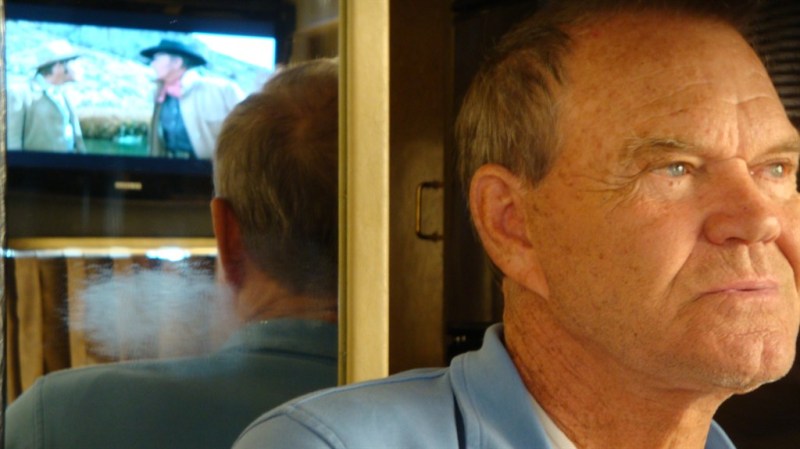As I write this, musician Glen Campbell is at a nursing care facility in Tennessee, where medical staff are ensuring that his last days on Earth are as good as they can be. Campbell has Alzheimer’s disease, which is attacking his brain and – stage by stage – robbing him of his capacity to function. In 2011, after announcing that he had Alzheimer’s, Campbell went on a farewell music tour and – volleying among fits of confusion, anger and normalcy – performed the hits that, for 50 years, have burnished his reputation as one of America’s most acclaimed singers. Campbell is 78.
A new documentary about that cross-country tour, Glen Campbell . . . I’ll Be Me, opens in the Bay Area on Friday, November 14. It’s an inside look at those concerts and all the behind-the-scenes doings, and an intimate look at Campbell’s struggle with the most rudimentary actions. What’s the name of his longtime wife? Campbell can’t remember, even as his wife, Kimberly Woolen, is inches away. Campbell sees footage of himself as a younger man and can’t recognize himself. “Oh,” he says when Woolen tells him.
“Oh.” That’s what Glen Campbell – the All-American man with the timeless cadence rooted in Arkansas – has become: a confused two-letter utterance. It’s painful to watch the stars of your childhood descend into physical hell. The stars of previous generations never allowed themselves to be filmed at their most fragile. In 1939, when Lou Gehrig announced that he was quitting baseball because of Amyotrophic Lateral Sclerosis, he walked away from the spotlight. Gehrig didn’t let cameras shadow him as he deteriorated toward death over the next two years.
But there’s a tremendous upside to seeing Campbell in Glen Campbell . . . I’ll Be Me. The documentary humanizes the star, and personalizes the last stages of a disease for which there is no cure. Alzheimer’s is a death sentence. In a pop culture that lionizes youth and good looks and worships veteran stars who somehow (plastic surgery, great genes, etc.) hold on to those looks, Campbell is an anomaly. One of a growing number, actually. Just this year, film critic Roger Ebert was the subject of the documentary Life Itself, which detailed – in excruciatingly candid footage – his battle with cancer of the thyroid and salivary glands. At the end of his life, Ebert’s lower jaw was grossly distorted as doctors raced to save his life. They didn’t succeed, but Ebert maintained his dignity till the last days of his life. We get to see that in Life Itself.

In Glen Campbell . . . I’ll Be Me, the dignity is there when Campbell thanks the filmmakers for following him through the good moments and bad, and when his family supports him onstage and off, even as they experience his temper tantrums. During the filming, Campbell seems capable of violence – against his family and himself. By the time we see the last concert, in Napa, Campbell’s wife and manager decide to shut down the tour because the singer is almost incapable of performing a whole concert. The applause from the concerts sustained the musician. Teleprompters fed him all the lines he had to sing, and told him when to play solo parts. His ability to sing was so ingrained in his brain that – despite losing lucidness – he could still get on stage and act like the old Glen Campbell.



